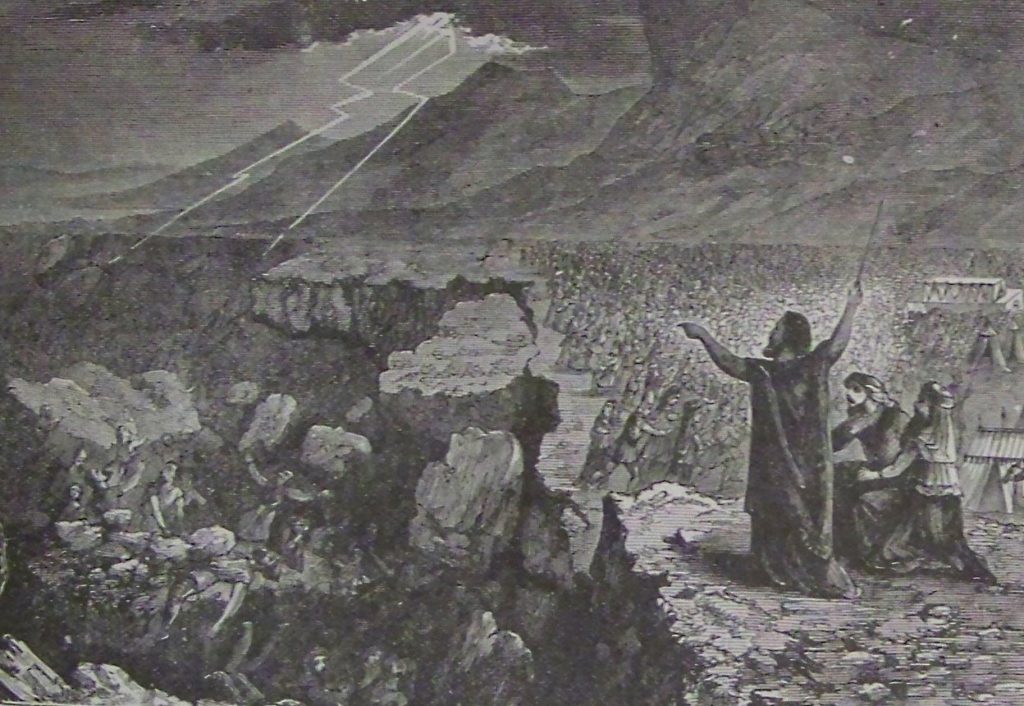Tag Archives: Socialism
Korah the Malcontent, Rebel and a Leftist

As we watch the rise of violent rebellion and civil disobedience in western—formerly Christian—nations (and elsewhere), it would behoove us to determine what is at the root and core of this movement, so that we can determine its source and what our response should be.
Human nature has never changed from the beginning of human history to the present. What is happening today has happened before. Only the actors, costumes and theater venues have changed, but the story’s plot is the same from the tree of knowledge in the Garden of Eden until now.
This ever-repeating and sad never-ending story goes like this: Elohim the Creator laid down certain rules and guidelines for humans to follow for their own blessing and well-being. Along came a snake in a tree to dissuade humans to rebel against Elohim’s rule of law, and rebellious and malcontented humans egged on by the same God-hating snake (that is, Satan the arch-rebel) have been marching to the same drum beat ever since.
We see the modern manifestations of this same satanic rebellion in the various current leftist movements that, like the many-headed Hydra of ancient Greek mythology, have many faces: leftism, atheism, secular humanism, moral relativism, socialism, the rise of the nanny-state, the rise in democratic mob rule, race wars, the attack on Judea-Christians values, the rise of false and Antichrist religious systems, evolution, rebellion against western culture and history and so on.
This is not to say that western culture is perfect and that there aren’t systemic problems that need fixing, and that some of the issues of the leftist malcontents aren’t legitimate. Indeed, there are problems that need fixing, but left’s solution of destroying the biblical foundations of the west is not the answer to the problem. It is like destroying the entire garden for the weeds growing therein. The problem is that the left generally wants to kill, steal and destroy in its effort to supposedly correct the problems in western societies that despite their weaknesses have generally done more good than harm in improving the human condition when held up against the backdrop of human history. And the left has no solutions to the problems in western culture. Their only solutions is societal upheaval and destruction—again to kill, steal and destroy. They cannot point to a single example past or present where their ideologies have worked. No. In the wake of leftist ideals, there has always been mass bloodshed, anarchy, mayhem, repression, loss of freedom, enslavement and loss of civil liberties. Always! Think Marx, Lenin, Stalin, Hitler, Mao, Castro, North Korea, Pol Pot and the sorry list goes on and on—just in the twentieth century alone!
To understand the evil spirit that is behind modern leftism, let’s go way back in time to the dusty pages of biblical history to one of the earliest leftists—Korah the malcontent. When we study his character, life and methods of operation, we will see many parallels between him and the modern rabble rousers who are trying to turn society on its head and usurp authority for themselves no matter the means or the cost.
The Spirit of Korah
The biblical story of Korah occurs in Numbers chapter 16. There we read,
“And they rose up before Moses, with certain of the children of Israel, two hundred and fifty princes of the assembly, famous in the congregation, men of renown: and they gathered themselves together against Moses and against Aaron, and said unto them, ‘You take too much upon you, seeing all the congregation are set apart/kadosh, every one of them, and YHVH is among them: wherefore then lift ye up yourselves above the congregation of YHVH?’” (Num 16:2–3)

The righteous must discern, identify and then oppose this evil spirit. Everywhere in every way, this demonic spirit of rebellion is attempting to destroy the work of YHVH Elohim on earth.
The spirit of Korah is currently alive and well on planet earth. The righteous must discern, identify and then oppose this evil spirit. Everywhere in every way, this demonic spirit of rebellion is attempting to destroy the work of YHVH Elohim on earth.
The spirit of Korah is the spirit of rebellion against YHVH and his divine authority and biblical truth. In our society, it is manifested in the philosophies of secular humanism, atheism, the New Age Movement, radical environmentalism, earth worship, so-called “progressivism,” socialism, Marxism and evolution, which are all aspects of the Babylon the Great, New World Order political-religious system that will oppose the saints of Yeshua and Yeshua himself at this second coming. We also see this spirit at work, supported and encouraged in international politics, in our own government, in our mainstream educational systems, in the major media, in the false religions of the world where foundational Judeo-Christian biblical values are being rejected and even demonized.
Continue readingKorah the Malcontent, a Rebel and a Secular Humanist—A LEFTIST!

As we watch the rise of violent rebellion and civil disobedience in western—formerly Christian—nations (and elsewhere), it would behoove us to determine what is at the root and core of this movement, so that we can determine its source and what our response should be.
Human nature has never changed from the beginning of human history to the present. What is happening today has happened before. Only the actors, costumes and theater venues have changed, but the story’s plot is the same from the tree of knowledge in the Garden of Eden until now.
This ever-repeating and sad never-ending story goes like this: Elohim the Creator laid down certain rules and guidelines for humans to follow for their own blessing and well-being. Along came a snake in a tree to dissuade humans to rebel against Elohim’s rule of law, and rebellious and malcontented humans egged on by the same God-hating snake (that is, Satan the arch-rebel) have been marching to the same drum beat ever since.
We see the modern manifestations of this same satanic rebellion in the various current leftist movements that like the many-headed Hydra of ancient Greek mythology have many faces: leftism, atheism, secular humanism, moral relativism, socialism, the rise of the nanny-state, the rise in democratic mob rule, race wars, the attack on Judea-Christians values, the rise of false and Antichrist religious systems, evolution, rebellion against western culture and history and so on.
This is not to say that western culture is perfect and that there aren’t systemic problems that need fixing and that some of the issues of the leftist malcontents aren’t legitimate. There are problems that need fixing, but left’s solution of destroying the biblical foundations of the west is not the answer to the problem. The problem is that the left generally wants to kill, steal and destroy in its effort to supposedly correct the problems in western societies that despite their weaknesses have generally done more good than harm in improving the human condition when held up against the backdrop of human history. And the left has no solutions to the problems of western civilization. Their only solutions is societal upheaval—to kill, steal and destroy. They can’t point to one example past or present where their ideologies have worked. In the wake of leftist ideals there as always been mass bloodshed, anarchy, mayhem, repression, loss of freedom, enslavement and loss of social liberties. Always!
To understand the evil spirit that is behind modern leftism, let’s go back to the Bible to one of the earliest leftists—Korah the malcontent. When we study his character, life and methods of operation, we will see many parallels between him and and the modern rabble rousers who are trying to turn society on its head and usurp authority for themselves.
The Spirit of Korah
The spirit of Korah is currently alive and well on planet earth. The righteous must discern, identify and then oppose this evil spirit. Everywhere in every way, this demonic spirit of rebellion is attempting to destroy the work of YHVH Elohim on earth.
The spirit of Korah is the spirit of rebellion against YHVH and his divine authority and biblical truth. In our society, it is manifested in the philosophies of secular humanism, atheism, the New Age Movement, radical environmentalism, earth worship, progressivism, socialism, Marxism, evolution, which are all aspects of the Babylon the Great, New World Order political-religious system that will oppose the saints of Yeshua and Yeshua himself at this second coming. We also see this spirit at work, supported and encouraged in international politics, in our own government, in our educational systems, in the media, in the false religions of the world, and in the apostate church where foundational Judeo-Christian biblical values are being rejected and even demonized.
The spirit Korah, the rebel, has even worked its way into the modern church system where it is attempting to subvert and pervert the truth of Elohim as revealed in the Bible, and to undermine legitimate, YHVH-ordained authority. Every man becomes his own spiritual leader, refuses the accountability afforded by authentic godly spiritual leadership, and basically chooses to do what is right in his own eyes. Many modern churches are going so far as to water down or reject core biblical truths and values and instead emphasize ecumenism, New Age thought, one-world spirituality and a social activist paradigm. Ultimately, this is a rejection of the divine truth of YHVH Elohim as revealed in the Scriptures.
The rebellion of Korah and his comrades against Moses and Aaron and Elohim’s resulting judgment against them is a prophetic picture of what will happen in the end times against all modern Korah-like rebels. In fact, it is a picture of the judgment of Elohim that will happen to ALL sinners who choose to rebel against YHVH, his will, his Word and truth, his plans and purposes and those on this earth who are carrying out his will.
The spirit of Korah continues to manifest itself in uprisings against godly authority both within the church, and globally as the New World Order, which the Book of Revelation calls Babylon the Great, takes a more strident and virulent stand against Elohim, the Bible and the saints.
The fate of Korah and his band of rebellious malcontents is a prophetic picture of YHVH’s end time judgments against all those who dare to stand against him. The second chapter of Psalm speaks about this:
Why do the heathen rage, and the people imagine a vain thing? The kings of the earth set themselves, and the rulers take counsel together, against YHVH, and against his anointed, saying, “Let us break their bands asunder, and cast away their cords from us.” He that sitteth in the heavens shall laugh: Adonai shall have them in derision. Then shall he speak unto them in his wrath, and vex them in his sore displeasure.… Thou shalt break them with a rod of iron; thou shalt dash them in pieces like a potter’s vessel.
The Spirit of Korah Under a Microscope

Although Korah was a Levite, the grandson of Levi, and therefore a cousin to Moses and Aaron, he was not a priest, but he coveted the priesthood given to Aaron and his sons.
Dathan, Abiram and On were sons Reuben who was the disinherited firstborn son of Jacob and coveted the leadership role over Israel that YHVH had given to Moses and Aaron.
In their minds, this group of men had legitimate and legally based grounds for being discontent. Korah was a Levite and Dathan and his friends were leaders of the firstborn tribe of Israel.
In their minds, they had legitimate gripes against Moses and Aaron. On that basis, they
Continue readingLeviticus 25—Natan’s Commentary Notes

Leviticus 25
Leviticus 25, The Biblical social welfare system.
The Biblical Social Welfare System Explained
Leviticus 25, in part, lays out Israel’s social welfare and economic system. Basically, it was a free market capitalistic economic system where private individuals owned property and small businesses and controlled the means and productions of goods and services, and the central government’s involvement in the lives of people was minimal. This is not the case in a purely socialistic (a Marxist or communistic) economic system where the government owns much or most of the property and controls, to one degree or another, the means and distribution of goods and services, and where government regulation of people’s lives is tremendous. The capitalistic system that YHVH gave to Israel, however, contained some quasi-socialistic checks and balances in that greedy or even exceptionally gifted and ambitious individuals couldn’t become excessively rich at the expense of the poor.
Socialistic economic philosophy demands that the wealth of the nation be equally distributed among everyone including the poor. This may sound good in theory, but it doesn’t work. In reality, socialism stifles individual initiative by punishing (often through taxation and other means of wealth confiscation and redistribution by the government) those who, through hard work, sacrifice, initiative, and inventiveness have become wealthy. So, it stands to reason, why should the wealthy work hard if the fruits of their labors will only be confiscated and be given to the poor or the “have nots, ” or to those who refuse to work?
At the same time, capitalism is also a flawed system, since in time, the wealthy often end up owning much of the land and control most of the wealth. Human nature being what it is, the greedy wealthy will turn a capitalistic system into oligarchic capitalism where only a few rich capitalists control nearly everything including the economic and political systems. This is the end times system that is described in Revelation 13 and 18 and is called Babylon the Great. Such a system ends up enslaving people through economic and political means, thus creating a veritable feudalistic-type serfdom where rich and powerful business oligarchs who control the government are the new nobility (see Rev 18:13, 23).
With these things in mind, as you are reading through chapter 25, notice how YHVH instructed the poor to be cared for. There was no government welfare system based on taxing the producers and giving to the non-producers. Everyone worked for their living. In fact, the Torah commands everyone to work for six days, and then to rest on the seventh day (Exod 20:9). Sloth and laziness weren’t optons. Even the extremely impoverished were expected to harvest food from the agricultural fields. At the same time, those who owned the fields were to leave the corners of their fields unharvested and not to glean their fields, so the poor would have something to harvest (Lev 23:22; the Book of Ruth). In the Testimony of Yeshua, fathers were expected to provide for their households. Those who didn’t were considered worse than heathens (1 Tim 5:8). Similarly, widows under the age of 60 were expected to support themselves through their own work, while those over the age of 60 could be supported by the local church, but they had to recompense the church through acts of service (1 Tim 5:9–14). Once again, the Bible in no way allows for or promotes a system of government handouts. Except in rare situations, everyone was expected to work.
In this chapter, we also see how the Bible handles the issue of debt, and how it requires people to work to pay off their debts. Bankruptcy wasn’t an option. The Torah allows those in debt to sell themselves into servitude to their debtors through a system called bond service. The debtor would work for the lender until the debts were paid and at the end of seven years all remaining unpaid debts had to be forgiven. This system taught fiscal responsibility to debtors, yet at the same time, it required lenders to show mercy and grace to the poor. Again, the Bible in no way promotes a system of government welfare handouts. Everyone had to work. If you didn’t work, you didn’t eat (2 Thess 3:10). Only the extremely poor who were unable to make a living (e.g. widows and orphans) were cared from the public coffers (Deut 14:28–29; 26:12–13). The Levites were care for publicly as remuneration for caring for and teaching the people spiritually. They also worked as farmers and tradesmen.
Notice how the jubilee year prevented the wealthy from acquiring all the land, and how every 50 years there was a redistribution of land, so that those who through sloth, mismanagement of their resources, or through unfortunate circumstances lost their land could get their land back. Such individuals were mercifully given a second chance to start over again and to learn from their past mistakes. Lending to the poor was encouraged, and the charging of interest to them was prohibited.
As you read through this chapter, consider how YHVH deals with the perennial social and economic ills that have plagued the world from time immemorial compared to how men currently deal with these same problems, and usually end up making matters worse.
Though it would be difficult to implement such a system in our highly collectivized and industrialized society of today, it is likely that in the future, during the Millennium, when the Torah will be the rule of the earth and an agrarian society will likely be the dominant economic paradigm, that such a Torah-based system will once again be put in place.
Leviticus 25:2, When you come into the land. The Stone Edition Chumash, translates Leviticus 25:2(b) as follows, “When you come into the land that I give you the land shall observe a Sabbath rest for [YHVH].” Note the emphasized portion. Though the Jewish sages say this does not imply that YHVH rests, it acknowledges the fact that as YHVH “rested” after his creation of the world, so too Israel was to rest in the seventh year from its agricultural work (an activity that allows the created [i.e. humans] to share with the Creator in the act of creation) to commemorate Elohim’s act of creation (The ArtScroll Rashi Leviticus, p. 318). The Jewish sages also note that the comparison between the jubilee and the Sabbath is that both bear testimony to Elohim’s creation of the universe in six days and his rest on the seventh. They further note that the seven years of the shemittah (sabbath year) cycle allude to the six thousand years of history that will be climaxed by the seventh millennium, which will be a period of peace and tranquility (The ArtScroll Stone Edition Chumash, p. 697).
Note how everything ancient Israel did in their day-to-day life brought them into worshipful relationship with their Creator by causing them to recall both what he had done for them (past tense) and what he would do for them prophetically (future tense).
Leviticus 25:4, A sabbath of rest unto the land. The land sabbath teaches us that our means of producing an income belong entirely to YHVH. He gives us life, breath, land, health, eyesight, physical and mental abilities and everything else that we need to survive. Now imagine losing, say, your health or your eyesight? Or due to an illness, suppose through a stroke or an injury to the head, you became mentally impaired. Where would you be financially? We belong to YHVH and he gives us everything we need with which to work our land, do our job, raise our family, educate ourselves, and to exist. Are we as grateful to him as we should be?
Leviticus 25:9, Jubilee. The word jubilee is the Hebrew word yovel (KcUh) meaning “ram’s horn trumpet.” The ram’s horn would be sounded at special events as a proclamation of great joy and jubilation such as would be the case at the commencement of the Jubilee Year when all debts were forgiven, all indentured servants were set free, all land was returned to its original owners, and all agricultural activity ceased for a year of rest. The arrival of the Jubilee Year was announced on Yom Kippur (Day of Atonement) with the blast of a shofar called the shofar hagadol or the great or final shofar blast (to be distinguished from the first and second shofar blasts that occur on the feasts of Shavuot (Pentecost) and Yom Teruah (Day of Trumpets or Shofar Blowing or Shouting) respectively. This same event prophetically corresponds with the return of the exiles (the “lost ten tribes”) to the land of Israel (which is an aspect of what the Jewish sages call the “final redemption”) and the return of Yeshua the Messiah.
Leviticus 25:21, And I will command my blessing.The land sabbaths forced the Israelites to depend totally on YHVH to bless them triple-fold in the sixth year of the seventh seven-year cycle (i.e. the forty-ninth year) of the 50 year jubilee cycle, so that they would have enough food to last in the seventh year (i.e. the forty-ninth year) as well as during year one of the next cycle while awaiting the harvest of that year’s crops. Observing the land sabbath and the Jubilee year was a major act of faith on the part of the farmer, who had to trust that YHVH would bless his crops so abundantly that he could take a year or more off from farming.
Though Israel was given YHVH’s laws concerning the land sabbaths, and though YHVH provided his people with a glorious opportunity to demonstrate incredible faith in him by blessing them abundantly in the sixth year, and see his miraculous provision, thereby strengthening their faith, thereby receiving even more blessings from YHVH the next time, thus strengthening their faith to even a higher level bringing of more blessings, Israel never kept the land Sabbaths for 490 years. Israel took the path of least resistance, which was not to trust YHVH’s Word and his promises, but to trust in themselves and their own reasonings—to follow the dictates of the carnal hearts. This led to the demise of their nation and ultimate captivity for 70 years—one year for each of the 70 land sabbaths they missed during that 490 years. What is our point? All of YHVH’s laws, even the seemingly least important ones, are important and effect not only our lives, but those of future generations, for they set laws of cause and effect into motion that YHVH has spiritually programmed into the universe. When we disobey YHVH, even in the slightest areas, we and our descendants will pay the price for our sins. In our modern godless economic system, observing the jubilee isn’t possible. On an individual basis, however, farmers can practice the land sabbath law as a way to care for the land and to show respect for and trust in the Creator of it.
Leviticus 25:35, If your brethren become poor. What do you do to help the poor? Treating them fairly and helping them when it is in your power to do so is very important in YHVH’s spiritual economy. (In this regard note, how the Testimony of Yeshua defines “pure religion” in Jas 1:27; also see Matt 25:34–46; Gal 6:10; 1 John 3:17–19; Isa 1:17; 58:6–7; Deut 15:7–8.)
Leviticus 25:42, Slaves. The Hebrew word slaves or bondmen is ebed meaning “slave, servant, man-servant, worshiper (of Elohim), servant (of Elohim, e.g. Levite, priest or prophet).” Ebed derives from the basic Hebrew root word and verb, abad, meaning “to work or serve.” The word abab refers to service that can be directed toward people, things or Elohim. In biblical usage, if directed toward things, abad can refer to tilling the earth, dressing a vineyard, working flax or constructing a city. When abad is used in reference to serving YHVH it can refer to Levitical and priestly service. In Hebraic thought, such service is considered joyous, not bondage. This same service can be directed toward pagan deities as well. When used in reference to serving another man, abad transforms into the noun ebed meaning “slave or servant.” As discussed below and as pointed out by The TWOT, the concept of Hebrew slavery isn’t akin to the modern concept of slavery where the slave possesses no basic human rights. This was not the case in ancient Israel. The Hebrew slave, on the other hand, occupied a position of status involving rights and trust. The Torah required this to be case as this and other Torah passages demonstrate.
Leviticus 25:45, You may buy.
Biblical “Slavery” Explained
This passage advocates “slavery” (more like a form of Medieval serfdom) among the Israelites. Yet, this is not the slavery the American Negroes, for example, experienced prior to the Civil War. Moreover, it must be remembered that slavery was rife in the ancient world. Make no mistake, is it still with us today in various forms including in the sex trafficking of both adults and children, in some branches of Islam and elsewhere.
In ancient times, however, often slaves were able to own homes and livestock and to maintain families as was the case with the Israelites in Egypt and the Jews in Babylon. In this case, these slaves were more like servants or feudal serfs. For example, in Israel, the Gibeonites became the slaves of Israel, but they continued to dwell in their own cities, and enjoy Israel’s military protection (Josh 9).
Also, it must be remembered that when Israel conquered an opponents’ land or army, they often inherited slaves from those countries or slaves from other countries the conquered country itself had enslaved. What were the Israelites to do with these people who had been dispossessed of their lands? Send them back to countries that no longer existed, or to which they were no longer welcome? Send them back into heathen situations? Instead, YHVH allowed Israel to bring these captured people into Israel where they could live among a Torah-obedient people who worshipped the God of Israel, YHVH Elohim, and where they would be taught to love Elohim totally and their neighbors as themselves. In time, these slaves would be assimilated into the tribes of Israel through intermarriage and become part of Israel and thus be elevated in their social status. In this sense, slavery was a means of not only assimilating foreigners and illegal aliens, but evangelizing those who found themselves in the lowest echelons of the ancient world. Biblical slavery was ostensibly a way eventually to bring such people into the ways of the Torah and giving them a respected position and inheritance in the land of Israel among the people of Elohim thereby elevating them spiritually and socially from their previous enslaved heathen condition.
Leviticus 25:55, Are my servants [or slave.] Here YHVH declares that “the children of Israel are my slaves [or servants, Heb. ebed], whom I have taken out of the land of Egypt—I am YHVH, your Elohim.” Here YHVH states dogmatically that he brought or redeemed the Israelites out of slavery to Egypt so that they could become his slaves. Does this trouble you? Being a slave o
New Video: The Leftist Donkeys Are Braying!!!
Charitable Giving Vs. Government Socialistic Welfare Handouts

Deuteronomy 15:7, Among you a poor man.
Multiple times, the Scriptures enjoins those who have been blessed materially to help those who are poor. In fact, YHVH even has a special place in his heart for a special class of individuals who have fallen into poverty, namely, the widows and the fatherless (Deut 14:29; 16:11, 14; 24:19; 26:12–13; 1 Tim 5:3). Let’s now discover some biblical guidelines about charitable giving.
Yeshua declared that the poor would always be among us (Matt 26:11), so there will never be a lack of opportunity for the so-called haves to help the have-nots. Furthermore, YHVH promises to bless us when we give to the poor (Ps 41:1–3) as well as to those who have dedicated their lives to serving YHVH’s people through the ministry (Deut 14:29; 16:14; 26:12–13).
In Deuteronomy 15:7, we discover that there are levels of priorities in our charitable giving. Our first responsibility is to help a poor person who is a brother, that is, who is a member of our immediate family, or someone who is like a brother to us. Second, we are to help those in need who reside in our gates, or are a member of our immediate community. Finally, and last, our charitability is to go toward those who are in need in our own land or country. The idea here is that our charitable giving is to go first to those who live the closest to us, and then go out from there geographically as we are able to do so financially. Too many churches have it backwards. They support to poor in other countries through evangelistic outreach, while neglecting the mission field or charitable giving on their own backyard.
In the Torah, there is a social welfare system in place to help the needy, but it comes with strict guidelines. For example, YHVH instructed the Israelites to set aside a certain portion of their income to help the poor. (Deut 14:28–29). For the ancient Israelites, this was a sort of social welfare system whereby those who had been blessed materially were commanded to help those who weren’t and were in need.
Moreover, the Torah had other social mechanisms whereby those who had fallen into poverty had the means to work themselves out of that economic state. There was no such thing as sitting idly and expecting a handout from society! For example, a poor person could sell themselves into servitude for a period of time until they worked themselves out of debt (Exod 21:2; Lev 25:39–55). Every seven years, debts were forgiven (Deut 15:1–2). Those who had an abundance financially and were in position to loan money to a poor person were forbidden from charging the lender any interest (Lev 25:35–38). Moreover, a poor person who had land could also sell their land to raise money; however, at the end of the 50 year jubilee cycle, that land would be given back to them (Lev 25:8–17).
Continue readingThe Rebellion of Korah and the Decline of America and the West

Some Selah Points to Ponder
Even as Korah rebelled against divinely installed lawful civil and spiritual authority, while at the same time attempting to raise himself up to replace that, similar trends have been occurring in the formerly Christian western nations of the world. Secular humanistic philosophies in their various permutations (evolution, Marxism, socialism,dialectical materialism, leftism, atheism, moral relativism and various other attacks on the Judeo-Christian values that have formed the bedrock of western culture) now dominate all aspects of western society and culture and are in an all out war against biblical values, morals and ethics. When we study the life and tactics of Korah and his band of malcontents, we see similarities between the forces of darkness and rebellion then and now.
- Num 15:30 — Wilful sin defined. Penalty for wilful sin is being cut off from Israel (i.e. a death penalty).
- Num 15:32–35 — Example of wilful sin given; i.e., a man wilfully violating the Sabbath.
- Num 15:37–41 — Wearing tzitzit is an outward visible reminder to help keep one from sinning (violating YHVH’s commands).
- Num 16:1 — The rebellion of Korah and company is an example of what wilful sin looks like on a societal level.
- Num 16:2 — Korah et al rose up in pride like the Lucifer—the spirit of pride (of sin) and rebellion against YHVH’s commandments (Isa 14:12–17).
- Num 16:7 — Pride of those who rise up against YHVH and divinely appointed leadership. In this case, it was pride and rebellion against Moses, who is a prophetic picture of Yeshua, godly leadership, the biblical leadership and the word and commandments of Elohim.
- Num 16:10 — This is the cry of the new agers, political leftists, some atheists, Satanists, God-haters and those who are under the control of the spirit of Antichrist. They ardently and petulantly declare that “we’re all the children of God. We’re all holy. We all have the divine within us. We are all gods and goddesses. Follow the cosmic Christ consciousness in you. Each of us can choose to follow our own will, the god within us, and do our own thing. Do what thou wilt is the whole law. If it feels good, do it.”
- Num 16:10 — This is the cry of those in our time who are rebellious and antagonistic against YHVH, his word and Messiah and don’t want Elohim to rule over them.
- Num 16:19 — Like Korah did, Satan in the end times will gather his rebellious Antichrist forces to oppose forcefully YHVH and Yeshua the Messiah in a final and epic showdown encounter called the battle of Armageddon.
- Num 16:20, 24–25 — This verse is analogous to YHVH’s statement in Revelation 18:4 calling for his saints to come out of Babylon the Great in order to escape his judgment against her.
- Num 16:25 — As Moses called for the Israelites to separate themselves from rebellious Korah, YHVH is calling his people to do the same now. Similarly, Yeshua called his disciples to the same to follow him (Matt 10:16, 26–39).
- Num 16:30 — Those who rejected Moses’ authority including the Torah have really rejected YHVH. Similarly, those who rejected the saints who have, in obedience, placed themselves under Elohim’s authority have not only rejected the saints, but Elohim as well.
- Num 16:31–34 — When YHVH returns to judge the earth, he will first judge Satan by casting him into the bottomless pit.
- Num 16:35 — After Satan is judged at the end of the last days, then those who rebelled against YHVH, His Torah–word and the Messiah will be cast into the lake of fire (Rev 20:11–15). These spiritual rejects are the wilful sinners who refuse to repent and to submit.
- Num 16:41–43 — These Israelites weren’t rebellious per se. They were merely examples of typical, complaining, spiritually lukewarm people. If these lukewarm Laodiceans refuse to repent (Rev 3:14–21), YHVH will consume some of them as he did the Israelites in this story.
- Num 16:46–48 — Prayerful intercession saves people. Aaron is a prophetic symbol of Yeshua, or Great High Priest, who is presently at the right hand of Elohim interceding for the saints against Satan, who is the accuser of the brethren. As Aaron risked his life by placing himself between Elohim’s judgment and the people, Yeshua did the same when his gave his life over to death on the cross as he suspended between heaven and earth between humanity and Elohim our Divine Judge.
- Num 17 — Aaron’s rod is a picture of the cross. As life came from Aaron’s staff—a piece of dead wood, the same came from the cross and the dead body of Yeshua. Moreover, the almond is the first tree to sprout forth in the land of Israel in the early spring, and is therefore a prophetic picture of life from the dead and fruitfulness. Interestingly, the Jewish sages have a tradition that both the tree of life and the menorah were an almond tree. Both are a picture of spiritual life in Messiah Yeshua.

